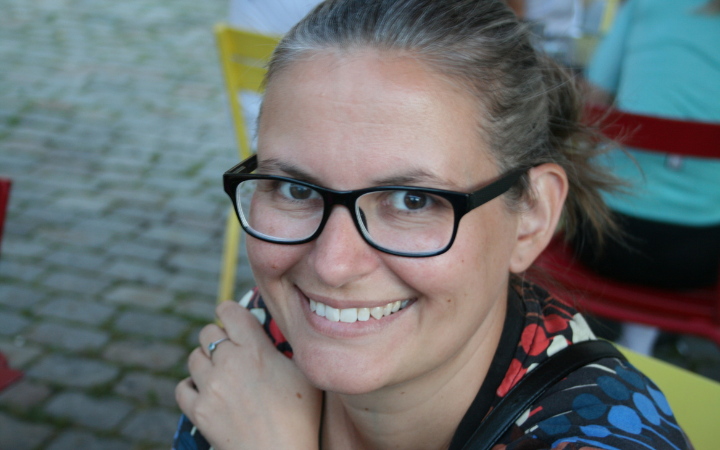Vibeke Oestreich Nielsen
Title: Inter-Regional Adviser on Statistical Training and Capacity Building, United Nations Statistics Division
Country: USA
Partnership: Global Network of the Institutes for Statistical Training
SDGs are the starting point for making sure countries work together in a coordinated way - respecting each country’s particularity - with the purpose of protecting our planet and its resources and making life better for all. The action plan for achieving these goals, also known as the 2030 Agenda for Sustainable Development, provides a framework to connect local efforts on sustainability with international actions. One of the most important aspects regarding the implementation of this agenda probably has to do with data. As the raw material for measuring impact, data allows us to have a better understanding of what is happening in our world in different areas such as health, gender equity, governance, and more. That is precisely what Vibeke Oestreich Nielsen is dedicated to.
With a background in economics, Vibeke started her career working at her country’s national statistical institute, Statistics Norway, at the Research Department and later on moved to the Division of Development Cooperation, which focuses on capacity development in statistics. Throughout the years she had the opportunity to cooperate with governments and international organizations. “I worked as a long-term adviser to the statistics office in Kyrgyzstan and I also collaborated with the Norwegian Refugee Council and the United Nations Refugee Agency on initiatives related to forced displacement”, she recalls. Now, as an Inter-Regional Adviser on Statistical Training and Capacity Building at the United Nations Statistics Division (UNSD), based in New York, Vibeke helps countries’ statistics offices and stakeholders enhance staff expertise on data collection and analysis. “I work in the branch that focuses on the SDG implementation, specifically on SDGs monitoring. I manage several projects and networks related to that”, she explains.
One of the initiatives Vibeke oversees is the Global Network of Institutes for Statistical Training, of which UNITAR is one of the founding members. Through the network, Vibeke has got to collaborate more closely with UNITAR. “UNSD serves as the network’s Secretariat. Therefore, we coordinate the network of institutes – global ones, regional ones, but also statistics offices that provide training outside of their own borders – and UNITAR is very active in the network”, she acknowledges. One of the major initiatives UNITAR was involved in was the creation of the UN SDG:Learn, a gateway that provides curated learning products and services on sustainable development topics to individuals and organizations. “We decided to establish a platform for statistics training courses, and UNITAR suggested to create it as a separate part of UN SDG:learn. This was discussed as the preferred option of the group. From that, we started working on the statistics subpage that became publicly available in 2020”, Vibeke says, adding that the general feedback has been positive.
Many of the statistics offices have developed very interesting materials and e-learning courses that probably would not have been widely known if we didn’t have a portal like that.
Since then, Vibeke has collaborated with UNITAR on many fronts. “There is a task team on statistical literacy led by UNITAR focused on improving knowledge around data and statistics in the general population. Back in 2018, UNITAR initiated a questionnaire on statistical literacy among policymakers and decision-makers, which has led to an e-learning course that I and other experts have provided inputs to". The course is about enabling policy-makers to interpret, use and communicate data more effectively as they develop, implement and evaluate public policies in different SDGrelevant areas.
The work on this course has been a very practical level of collaboration linked to the network and as a result, we have also started looking into developing microlearning on statistics.
Indeed, UNITAR has been actively promoting the use of microlearning – and other creative approaches – as an effective way to raise awareness about the importance of data and the value of official statistics. On top of that, Vibeke is working together with UNITAR on an initiative related to citizen-generated data and citizen science. “We are co-leading a project called ‘Data for Now’, which aims to support statistics offices to increase the availability of the SDG data using a variety of different sources including innovative sources”, she describes.
For Vibeke, working with UNITAR has been a positive experience so far. “I really appreciate UNITAR’s approach of focusing on cooperation and working together”, she reveals adding that UNITAR’s expertise on learning development comes in handy too. “The quality of the work improves as we bring different skills. For instance, we are now in the process of creating some e-learning courses for another project and we consult with UNITAR on this matter. We are bringing the statistical knowledge and UNITAR brings the knowledge on learning development”, she explains. From her perspective as a representative of the Secretariat, Vibeke is also glad to see UNITAR engaging with other members of the network. “Yes, as the Secretariat we have been working together with UNITAR on these initiatives, but UNITAR also engages on other elements of the global work that I am not responsible for. There is a lot of collaboration between the organizations.” We are excited to continue contributing to efforts to strengthen national statistical systems!


